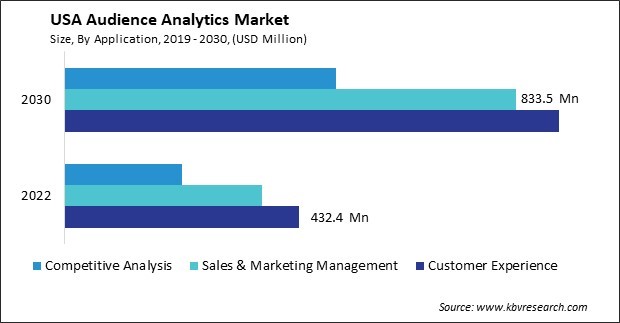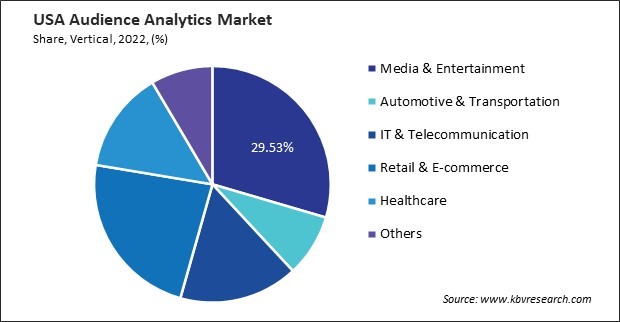The USA Audience Analytics Market size is expected to reach $2.2 billion by 2030, rising at a market growth of 10.6% CAGR during the forecast period.
The audience analytics market in the United States is experiencing substantial growth, driven by the imperative for businesses to effectively comprehend and engage their target audiences. The digital transformation across industries, notably in media, entertainment, retail, and e-commerce, underscores the industry’s significance.

As privacy concerns and data protection regulations take center stage in the United States, transparent data collection practices and robust consent management systems become crucial. The integration of audience analytics with emerging technologies like augmented reality and virtual reality opens new avenues for user experience and interaction in the evolving digital landscape. Audience analytics is instrumental in personalizing content experiences in the U.S. media and entertainment industry. Advanced algorithms and machine learning enable real-time, highly personalized content recommendations, boosting user satisfaction, retention, and loyalty. Media companies prioritize optimizing viewer engagement through real-time analytics tools, making instantaneous adjustments based on viewer interactions and preferences to ensure content remains engaging.
A paradigm shift is observed in monetization strategies, with a move away from traditional revenue models in the U.S. Data-driven approaches, including targeted advertising and personalized subscription models, are gaining prevalence, maximizing the effectiveness of ad campaigns, and fostering valuable user experiences. In the U.S. retail and e-commerce industry, audience analytics transforms customer journey analytics. Businesses gain a profound understanding of how customers navigate digital and physical touchpoints, optimize the shopping experience, and drive customer satisfaction and loyalty. Personalization is a standout contribution of U.S. retail and e-commerce to the audience analytics market, with advanced analytics, algorithms, and machine learning enabling highly personalized product recommendations in real-time, fostering customer retention and loyalty.
The estimated value of U.S. e-commerce retail sales for the third quarter of 2023, as the United States Census Bureau reported, was $284.1 billion. This figure reflects an increase of 2.3 percent (±0.4%) compared to the second quarter of 2023. Total retail sales for the third quarter of 2023 were estimated at $1,825.3 billion, an increase of 1.5 percent (±0.2%) from the second quarter of 2023. The third quarter of 2023 e-commerce estimate increased by 7.6 percent (±1.2%) from the third quarter of 2022, while total retail sales increased by 2.3 percent (±0.4%) in the same period. E-commerce sales in the third quarter of 2023 accounted for 15.6 percent of total sales. Thus, the expanding retail and e-commerce industry of the U.S. has emerged as a driving factor propelling the demand for the audience analytics market.
The media and entertainment sector has significantly influenced and revolutionized the audience analytics market in America. The synergy between these sectors and the evolution of digital technologies has given rise to an era where understanding and engaging audiences on a profound level are paramount to success. The industry in the U.S. is undergoing a transformative evolution with the rapid ascent of audience analytics. Audience analytics, encompassing the collection and analysis of vast datasets related to viewer engagement, is pivotal in shaping strategies across the sector.
The International Trade Administration states that, at $660 billion (of the $2 trillion worldwide industry), the media and entertainment (M&E) industry in the United States is the largest in the world. Therefore, in the U.S. retail and e-commerce sector, the impact of audience analytics is equally transformative. Customer journey analytics, powered by sophisticated data analysis, provide businesses with a comprehensive understanding of how customers navigate digital and physical touchpoints. This insight enables retailers to optimize the shopping experience, ensuring that products and services align with consumer preferences. Personalization takes center stage as advanced analytics, algorithms, and machine learning contribute to real-time, highly personalized product recommendations. This not only drives customer satisfaction but also strengthens customer retention and loyalty.
The surge in awareness is attributable to high-profile data breaches and privacy scandals that have underscored the vulnerability of personal information. Consumers are now more informed and discerning, demanding greater transparency and control over how their data is collected, utilized, and shared. This evolving landscape is further shaped by regulatory changes, like the California Consumer Privacy Act (CCPA), which has set data protection standards benchmarks. The implementation of such regulations has influenced consumer expectations and compelled businesses engaged in audience analytics to adopt more robust privacy measures. As a result, obtaining explicit consent from users has become a focal point for companies, reflecting a growing emphasis on ethical data collection practices.
In response to the escalating concerns, businesses invest in enhanced security measures. The audience analytics market is witnessing the widespread adoption of encryption, secure data storage protocols, and stringent access controls to fortify against potential cyber threats and data breaches. Furthermore, companies embrace transparency as a fundamental principle, openly communicating their data collection methods, purposes, and usage to build and maintain consumer trust. Therefore, the audience analytics market is transforming as heightened consumer awareness, spurred by data breaches and regulations like the CCPA, compels businesses to prioritize ethical data practices, obtain explicit consent, and enhance security measures to build and maintain trust.

The landscape of the audience analytics market in the United States is marked by intense competition as companies strive to innovate and differentiate themselves in a rapidly evolving industry. The rising recognition of the strategic importance of audience analytics across various sectors, including media, retail, e-commerce, and more, drives this robust competition. As businesses vie for market share, several key factors contribute to the dynamic competition within this domain. Some prominent companies known for their presence in the U.S. audience analytics market include Nielsen Holdings plc, Oracle Corporation, IBM Corporation, Google LLC, Microsoft Corporation, etc.
Cratejoy, a subscription box platform headquartered in Austin, Texas, has played a notable role in the retail and e-commerce sectors in the United States, particularly in the context of audience analytics. The organization offers tools that let companies divide their customer base according to various factors, including preferences, demographics, and spending patterns. Through audience segmentation, businesses using Cratejoy can create targeted marketing campaigns, tailoring their products and promotions to specific customer segments in the U.S.
Adobe, a worldwide leader in digital media and marketing solutions, has indeed played a major role in shaping the audience analytics market, particularly in the media and entertainment sector in the U.S. Adobe Analytics allows businesses to create detailed audience segments based on various parameters, including demographics, behavior, and preferences. Media and entertainment companies can leverage these audience segments to deliver personalized content, enhancing the overall user experience and increasing audience engagement.
By Component
By Application
By Enterprise Size
By Vertical
Our team of dedicated experts can provide you with attractive expansion opportunities for your business.

